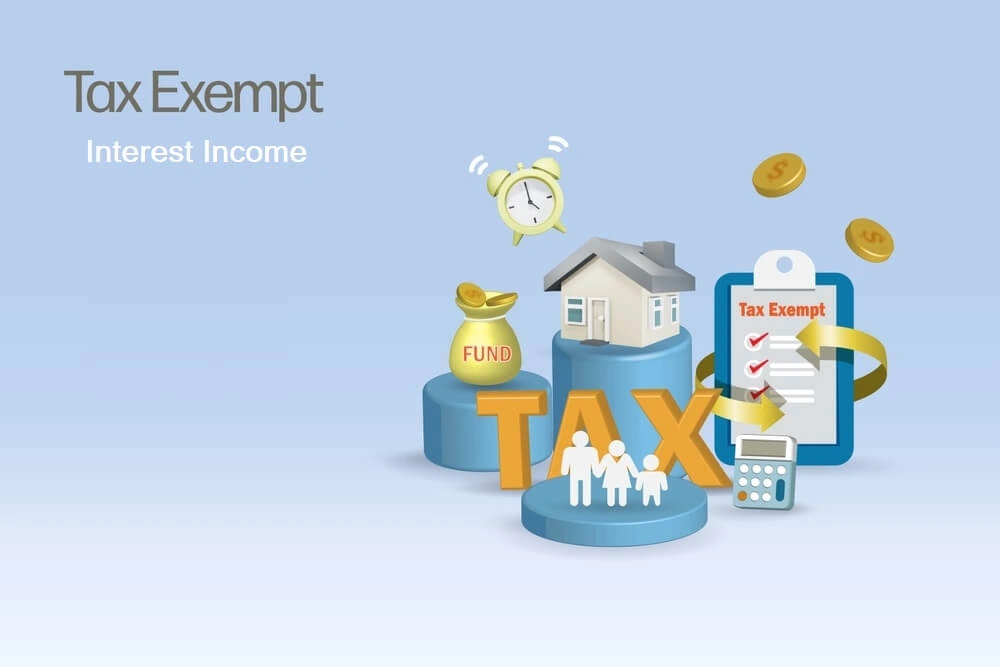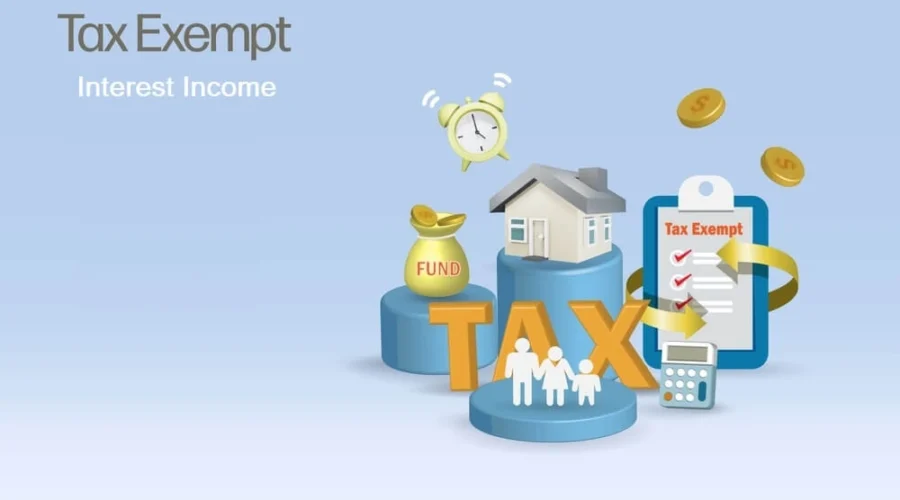Tax-Exempt Interest Income Explained: Top Investments That Save You Money on Taxes
Tax-exempt interest income refers to earnings from specific investments that are not subject to federal income tax, such as municipal bonds and certain mutual funds. This type of income allows investors to grow their wealth while reducing tax liability.

Content
Understanding Tax-Exempt Interest Income
Tax-exempt interest income is derived from investments where the interest payments are excluded from gross income for federal tax purposes. These investments are particularly attractive to individuals in higher tax brackets and those seeking stable, tax-efficient income sources.
Unlike taxable interest from corporate bonds or savings accounts, tax-exempt interest gives you the advantage of earning income that doesn’t increase your annual tax bill. These instruments are legally recognized by the Internal Revenue Service and are commonly issued by state or local governments.
Why It Matters
As tax rates fluctuate and the demand for tax efficiency rises, tax-free income becomes increasingly essential in portfolio planning. With inflation impacting real returns, minimizing taxes is one of the most powerful strategies for preserving wealth.
How Does Tax-Exempt Interest Work?
Not all investments qualify for tax-exempt interest income. To benefit, an investor must hold specific types of securities, most commonly municipal bonds issued by state and local governments. These bonds often fund public infrastructure projects such as schools, roads, and hospitals.
Federal vs. State Tax Exemption
While most municipal bond interest is exempt from federal taxes, some may also be triple tax-exempt bonds—free from federal, state, and local taxation if the investor resides in the issuing municipality. For example, a New York resident investing in a New York-issued bond might enjoy all three layers of exemption.
Top Tax-Free Investment Options
To help investors maximize tax-exempt interest income, several options are available that cater to varying risk tolerances and financial goals.
Municipal Bonds
Municipal bonds (munis) are debt securities issued by local governments. They offer relatively low yields but come with the significant advantage of tax-free income. The interest from these bonds is usually free from federal income tax and may also be exempt from state and local taxes.
Investors favor these for their reliability and the added benefit of triple tax-exempt bonds in certain cases. While the returns may be lower than corporate bonds, the after-tax yield often makes them more competitive, especially in higher tax brackets.
Tax-Exempt Mutual Funds
For those who prefer a diversified approach, tax-exempt mutual funds pool investments into portfolios of municipal bonds. These funds distribute exempt-interest dividends, which, like the underlying bonds, are typically not taxed at the federal level.
Managed by professional portfolio managers, these funds provide built-in diversification and can be ideal for investors looking for ease of management and exposure to a broad municipal bond market.
Municipal Bond ETFs
Exchange-traded funds (ETFs) that focus on municipal debt are gaining traction. Municipal bond ETFs combine the benefits of tax-exempt interest income with the flexibility and liquidity of stock trading.
Investors appreciate the lower fees compared to mutual funds and the ability to buy or sell throughout the trading day. Popular examples include funds that target specific states or durations, helping tailor a tax-free income strategy.
Tax-Free vs. Taxable Investments: A Comparison
Many investors mistakenly compare gross returns between taxable and tax-free investments. To make an accurate assessment, the tax-equivalent yield calculator comes into play.
Example Calculation
Suppose you earn 3.5% interest from a tax-exempt municipal bond, and your tax bracket is 32%. The tax-equivalent yield would be calculated as:
Tax-equivalent yield = Tax-free yield / (1 – tax rate)
= 3.5% / (1 – 0.32)
= 5.15%
This means you would need to earn 5.15% from a taxable bond to match the return from your tax-free investment. Tools like a tax-equivalent yield calculator help investors make informed choices.
Who Benefits Most from Tax-Exempt Investments?
While anyone can invest in tax-exempt securities, they are especially advantageous for:
- High-income earners: Reducing taxable income is vital when subject to top-tier tax rates.
- Retirees: Seeking stable, recurring income with minimal tax implications.
- Residents in high-tax states: California and New York residents, for instance, may greatly benefit from triple tax-exempt bonds.
By including tax-exempt interest income in a broader financial strategy, these investors can increase net income while lowering tax exposure.
Key Risks and Considerations
Though attractive, tax-free investments are not without risks:
Interest Rate Sensitivity
Like all bonds, municipal bonds are sensitive to changes in interest rates. Rising rates typically reduce bond prices, affecting your portfolio’s market value.
Credit Risk
While most municipal bonds are backed by government entities, there is still a risk of default. Investors should evaluate the creditworthiness of the issuing municipality.
Liquidity
Municipal bond ETFs and funds offer better liquidity than individual bonds, which may be difficult to sell quickly without a loss in value.
Reporting Tax-Exempt Income Correctly
Even though tax-exempt interest income is not federally taxed, it must still be reported to the IRS. You will receive Form 1099-INT, which shows the amount of exempt-interest dividends received.
Some states require that tax-exempt interest be included in your state taxable income, so understanding the local tax code is important. Consulting a tax professional can ensure full compliance.
Strategies to Maximize Tax-Free Income
Diversify Across Instruments
Include a mix of municipal bonds, tax-exempt mutual funds, and municipal bond ETFs to spread risk and create a resilient income stream.
Bond Laddering
Stagger bond maturities to reduce interest rate risk and maintain regular income.
Use Tax-Equivalency Tools
Regularly compare yields with taxable alternatives using a tax-equivalent yield calculator to ensure optimal portfolio choices.
Work with a Financial Advisor
A professional can help customize a tax-free strategy that aligns with your personal income and retirement goals.
Conclusion
With economic uncertainty and evolving tax regulations, tax-exempt interest income stands out as a smart financial tool. Whether you’re a retiree seeking steady returns or a high-earner looking to optimize your tax bill, tax-free investments like municipal bonds, tax-exempt mutual funds, and municipal bond ETFs offer compelling advantages.
By understanding how these assets work and integrating them thoughtfully into your portfolio, you can reduce your taxable income and achieve greater financial efficiency. Always ensure compliance with IRS guidelines and consider personalized advice for optimal results.
FAQs
What is tax-exempt interest income?
Tax-exempt interest income is interest earned from investments like municipal bonds that is not subject to federal income tax.
Are municipal bonds completely tax-free?
Most municipal bond interest is exempt from federal tax. Some bonds may also be exempt from state and local taxes if you’re a resident of the issuing state.
How do tax-exempt mutual funds work?
Tax-exempt mutual funds invest in municipal bonds and distribute exempt-interest dividends, offering tax-free income to investors.
What is a triple tax-exempt bond?
A triple tax-exempt bond is free from federal, state, and local income taxes, usually available to investors who reside in the issuing municipality.

A business blog writer at the age of 19, Francis is a jack-of-all trades when it comes to writing. He specializes in content creation for businesses and blogs. With years of experience under his belt, he’s able to provide both written and video content that will engage readers and viewers alike!


